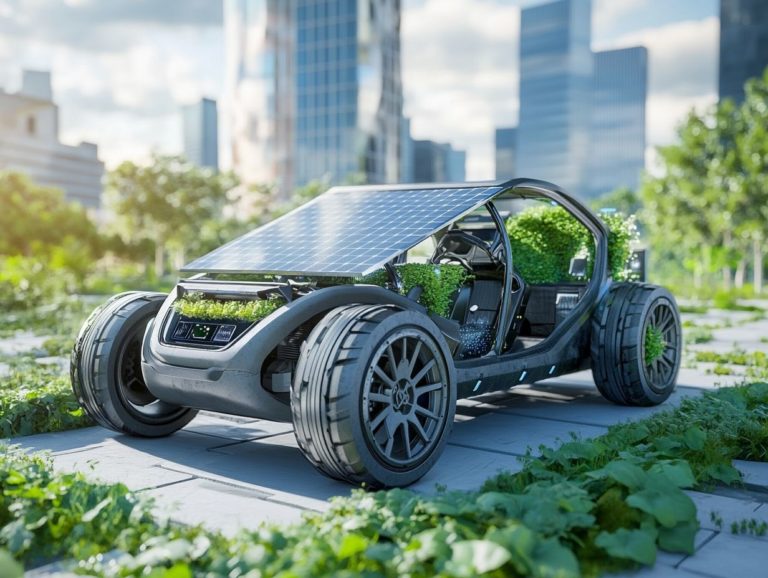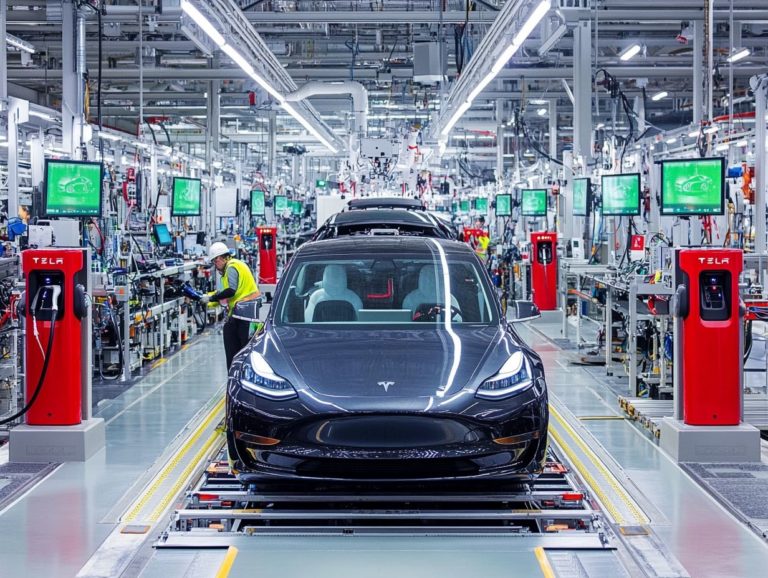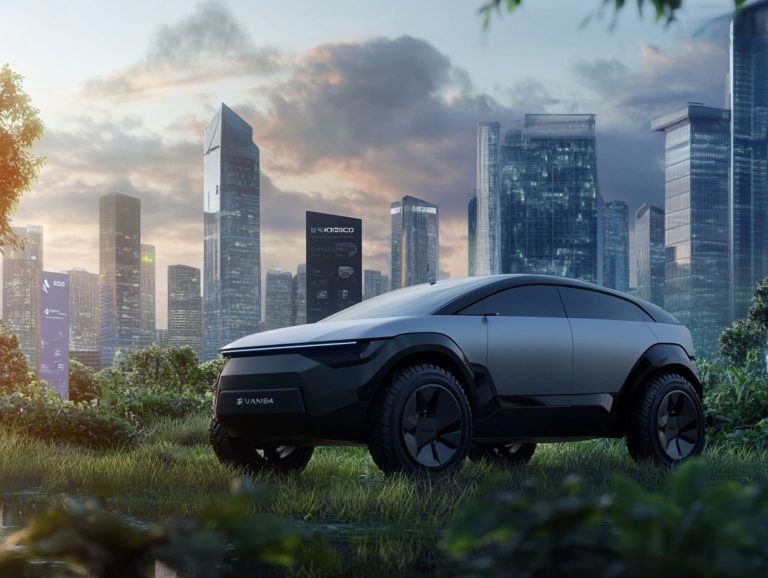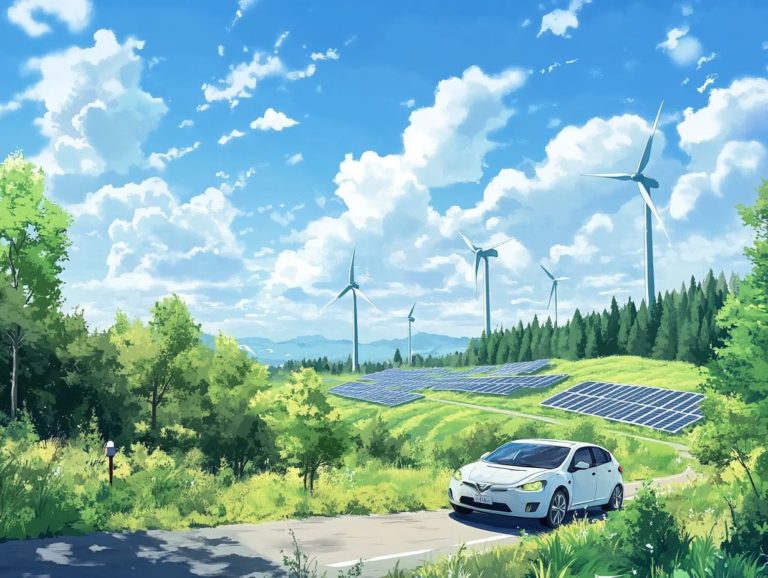5 key benefits of electric vehicles in 2024
As the world embraces greener alternatives, electric vehicles (EVs) stand at the forefront of this transformative revolution.
In 2024, the reasons to adopt EVs are more compelling than ever. The benefits range from significantly reduced carbon emissions to lower operating costs, making the advantages truly multifaceted.
With government incentives and technological advancements further enhancing their appeal, you might find yourself drawn to the electric vehicle landscape.
This article delves into five key benefits of electric vehicles, exploring their impact on the environment, the economy, and emerging market trends.
Discover how this groundbreaking technology is reshaping your driving experience and paving the way for a sustainable future.
Contents
- Key Takeaways:
- 1. Reduced Carbon Emissions
- 2. Lower Operating Costs
- 3. Government Incentives and Rebates
- 4. Improved Performance and Driving Experience
- 5. Advancements in Technology
- How Will Electric Vehicles Impact the Environment and Climate Change?
- Frequently Asked Questions
- What are the top 5 key benefits of electric vehicles in 2024?
- How will electric vehicles contribute to a more sustainable future in 2024?
- What advancements in technology can we expect to see in electric vehicles by 2024?
- Will electric vehicles save me money in the long run?
- How will the availability of charging stations impact the use of electric vehicles in 2024?
- What can we expect from the future of electric vehicles in 2024?
Key Takeaways:
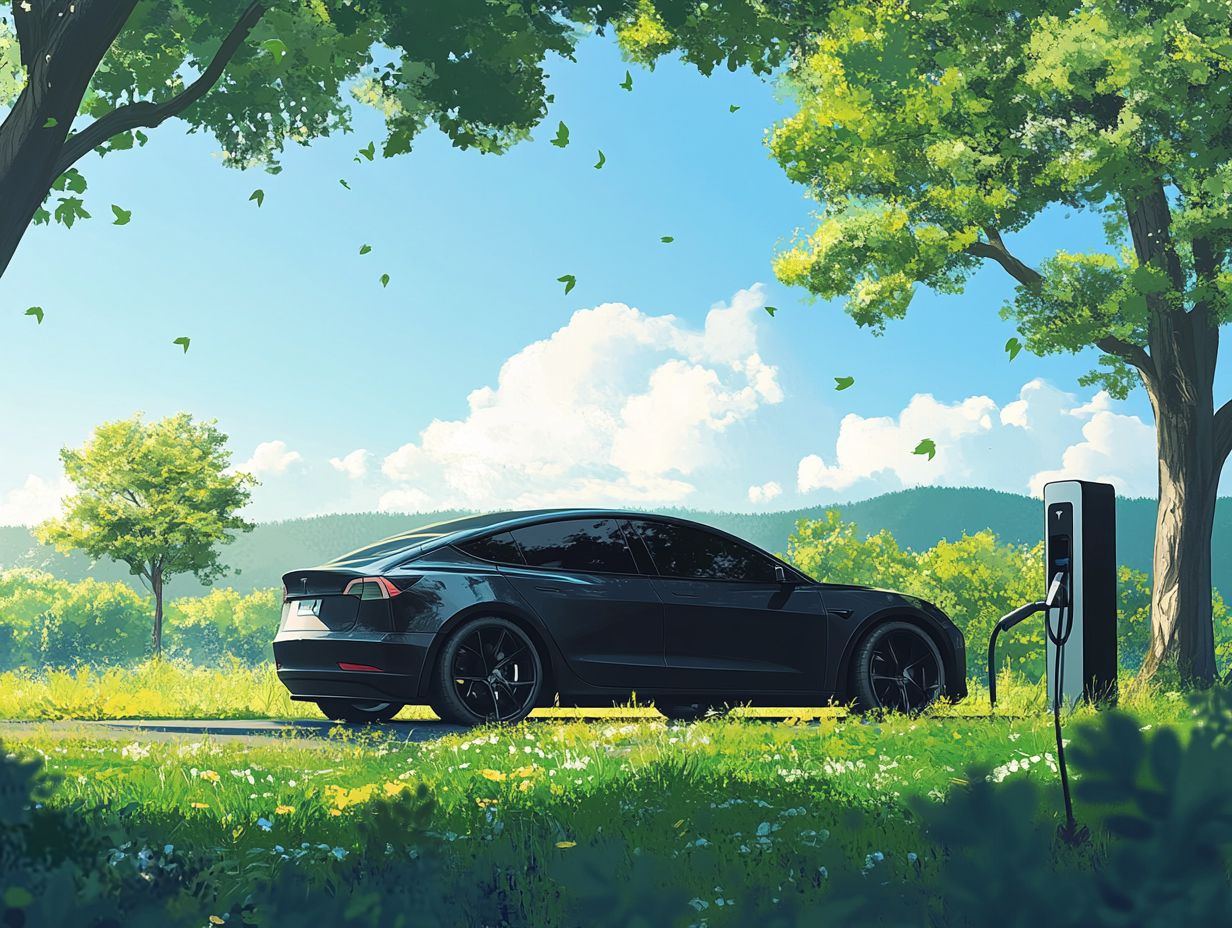
By 2024, electric vehicles will significantly reduce carbon emissions, providing a key solution to climate change. Their lower operating costs, thanks to reduced fuel and maintenance expenses, will make them more affordable and accessible to the masses. Here are 5 reasons to support electric vehicle initiatives, as government incentives and rebates for purchasing electric vehicles will drive their popularity and contribute to a greener future.
1. Reduced Carbon Emissions
The shift to electric vehicles (EVs) in the transportation sector plays a vital role in cutting down greenhouse gas emissions, which is essential for tackling climate change. In the United States, industry leaders like General Motors and Tesla are at the forefront of this EV revolution.
By choosing electric vehicles over traditional combustion engines, you have the power to cut emissions drastically and reduce lifecycle impacts. This demonstrates how EVs can revolutionize the automotive sector and lessen environmental damage.
Recent studies show that widespread adoption of EVs could slash carbon dioxide emissions in the transportation sector by up to 80% by 2050. This transformation is crucial, considering that the transportation sector accounts for nearly 29% of total greenhouse gas emissions in the U.S.
Companies like Ford are making significant investments in sustainable technology such as solar-powered charging stations and battery recycling initiatives. By aligning their strategies with renewable energy sources, these manufacturers are addressing traditional concerns about electricity sourcing while paving the way for a cleaner, greener future.
2. Lower Operating Costs
Electric vehicles (EVs) present a compelling choice for those looking to reduce operating costs compared to traditional vehicles. By opting for an EV, you can save on fuel and maintenance expenses while enjoying surprising benefits of EV financial incentives driven by innovations in battery production.
With the promise of significant savings at the pump, are you ready to save money on fuel? You’ll likely find that your monthly budget for refueling becomes much more predictable. The fewer moving parts in electric drivetrains translate to fewer trips to the mechanic and lower repair bills over time.
When you evaluate the total cost of ownership, it becomes evident that while the initial purchase price of EVs may be higher, the long-term savings in fuel and maintenance are substantial. As fuel prices rise and government incentives become more attractive, the shift towards electric vehicles becomes even more enticing for a broad range of buyers.
3. Government Incentives and Rebates
The Inflation Reduction Act has ushered in a suite of government incentives and rebates aimed at promoting electric vehicle (EV) adoption. This makes it financially appealing for you while fostering significant domestic investments in the EV manufacturing sector.
These incentives ranging from tax credits to rebates and reduced registration fees can dramatically decrease the upfront costs associated with purchasing an electric vehicle. As you recognize these financial benefits, your interest in EVs is likely to surge, prompting you to consider them as viable alternatives to traditional vehicles.
This shift enhances competition within the automotive industry and drives advancements in technology and infrastructure. As domestic manufacturers ramp up production in response to your increasing demand, the positive economic ripple effects can lead to job creation and spur innovation, reinforcing the market’s dedication to sustainable transportation solutions.
4. Improved Performance and Driving Experience
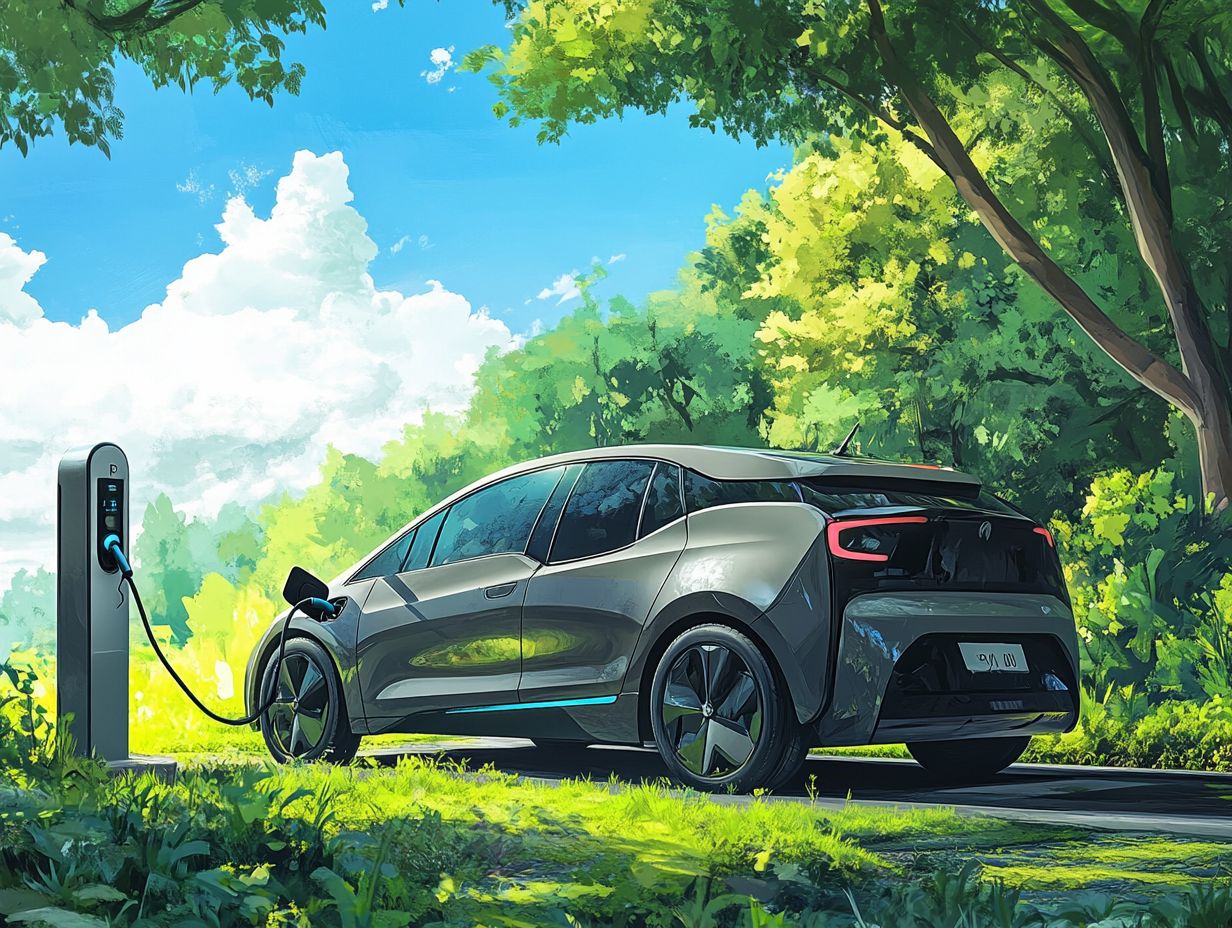
The latest electric vehicles, like the Tesla Model S, Ford Mustang, and Kia EV6, deliver unparalleled performance and an exceptional driving experience. With features such as instant torque delivery and seamless access to EV chargers, these cars redefine what it means to drive electric.
Feel the exhilarating quickness as they accelerate, paired with remarkable handling that transforms every corner and curve into a joyride. The responsive steering and dynamic stability elevate your driving experience, providing an engaging and confident feel on the road.
The growing EV charger infrastructure is crucial. It allows you to recharge your vehicle with ease and eliminates any lingering range anxiety. This accessibility enhances your overall experience, enables longer journeys, and offers newfound freedom to explore free from the stress of locating a charging station.
5. Advancements in Technology
Advancements in technology are reshaping the electric vehicle (EV) landscape. They significantly enhance battery manufacturing processes and improve energy consumption efficiency. You ll get ready to experience the incorporation of renewable sources in production, benefiting both your wallet and the environment.
Innovations are making electric vehicles easier to produce and more accessible to everyone. For instance, cutting-edge battery technology, like newer solid-state batteries, improves performance while reducing costs. This allows you to cover greater distances without the constant need to charge.
Meanwhile, advancements in energy efficiency enhance your vehicle’s overall performance while minimizing its environmental footprint. By integrating renewable energy sources for charging, your dependence on fossil fuels diminishes, paving the way for greener energy consumption.
As these technologies evolve, expect enhanced affordability and reliability in EVs. They are becoming increasingly attractive choices for eco-conscious buyers eager to invest in a sustainable future.
How Will Electric Vehicles Impact the Environment and Climate Change?
Electric vehicles (EVs) are set to make a remarkable difference in the fight against climate change. They significantly cut down greenhouse gas emissions and champion the use of renewable energy sources. To learn more about their impact, consider exploring the benefits of driving electric. This shift paves the way for sustainable energy solutions that can help mitigate the adverse effects of climate change on our planet.
As you embrace these vehicles, you’re joining a growing trend that encourages a move away from fossil fuels. This results in cleaner air and healthier communities. If you’re considering options for your family, check out the top 5 electric vehicles for families in 2024. Adopting renewable energy sources for charging infrastructure amplifies the ecological advantages of electric vehicles and fosters a powerful synergy between EVs and green energy initiatives.
By integrating EV technology with sustainable practices like solar or wind energy, you can actively reduce your carbon footprint. Investing in a robust charging network guarantees convenient access to clean alternatives, making it easier for you to partake in this greener evolution of transportation and champion environmental sustainability.
What Are the Different Types of Electric Vehicles?
Electric vehicles present a fascinating array of options, including battery electric vehicles (BEVs), hybrid vehicles, and plug-in hybrids. This variety gives you a wealth of choices tailored to your preferences and driving needs in this evolving EV landscape.
Each type of electric vehicle comes with its own set of features that can significantly influence your purchasing decisions.
- Battery electric vehicles (BEVs) operate solely on electric batteries. They are acclaimed for their zero-emission performance and lower overall energy costs, making them a top choice for those who prioritize environmental responsibility.
- Hybrid vehicles blend an internal combustion engine with electric propulsion, offering a flexible solution for anyone concerned about charging availability.
- Plug-in hybrids grant you the best of both worlds electric and gasoline power. This allows you to enjoy the advantages of electric driving during your daily commutes while having the peace of mind that comes with traditional fuel for longer journeys.
Ultimately, selecting the right type hinges on your driving habits, the availability of local charging options, and your personal values regarding sustainability.
What Are the Current Market Trends for Electric Vehicles?
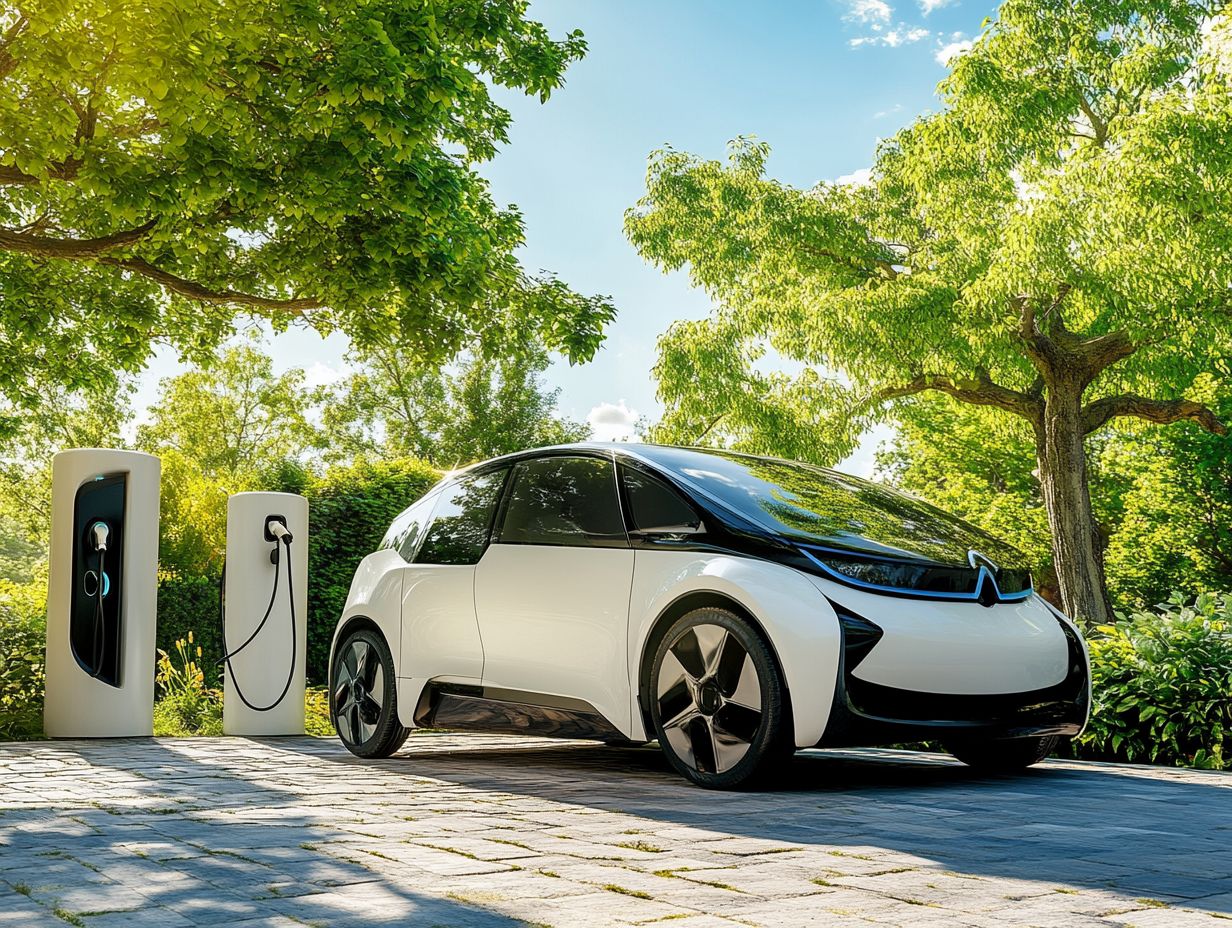
Electric vehicles (EVs) are gaining popularity. Recent trends show that more people are choosing EVs due to better battery technology and lower prices.
Statistics reveal global EV sales surged over 50% last year. This shift is influenced by the desire for sustainability and benefits like government incentives.
As manufacturers increase production and improve charging options, EVs become more appealing to everyday consumers.
Industry analysts note that ongoing advancements in supply chain efficiencies will likely lower prices even further. This will make EVs accessible to more individuals.
What Are the Potential Roadblocks for Widespread Adoption of Electric Vehicles?
Electric vehicles (EVs) have many benefits, but there are still some challenges to overcome for their widespread adoption, as highlighted in the 5 most anticipated electric vehicles of 2024.
Limited availability of EV chargers and challenges in public charging infrastructure can create hesitancy among potential buyers. You might wonder about the practicality of owning an EV in daily life.
For instance, the fear of running out of charge without a nearby station can be daunting. The lack of flexible charging options may intensify these worries.
You might also have concerns about the impact of mining essential minerals used to make batteries, like lithium and cobalt.
To overcome these challenges, investing in comprehensive charging networks is essential. Educating the public on the benefits of EVs and ensuring the sustainable sourcing of battery materials will build confidence.
How Can Electric Vehicles Benefit the Economy?
Electric vehicles (EVs) can significantly enhance the economy. They promote domestic investments and job creation in the EV manufacturing sector.
By building a strong supply chain around EV production, we create a ripple effect that positively impacts various industries, such as battery manufacturing and software development.
As communities invest in EV infrastructure, local economies can thrive. This creates not only production jobs but also opportunities in service sectors like maintenance and repairs.
These investments lead to improved energy efficiency, reduced emissions, and a diversification of energy sources. All of these benefits are crucial in today s economy.
What Are the Future Predictions for Electric Vehicles?
Future predictions for electric vehicles (EVs) indicate significant growth in consumer adoption. Ongoing advancements in battery manufacturing will make EVs more accessible and efficient, with options like the top 5 luxury electric vehicles of 2024 leading the way.
As charging infrastructure expands, the fear of running out of charge will gradually lessen. This leads to increased market penetration of EVs.
The movement toward sustainability and government incentives will encourage more people to embrace greener alternatives.
We can expect a rising interest in smart technology integration within vehicles. This will drive innovations in infotainment and connectivity, enhancing your overall experience.
With trends leaning toward urbanization and environmental awareness, EVs are set to become a necessity for many individuals in the coming years.
Frequently Asked Questions
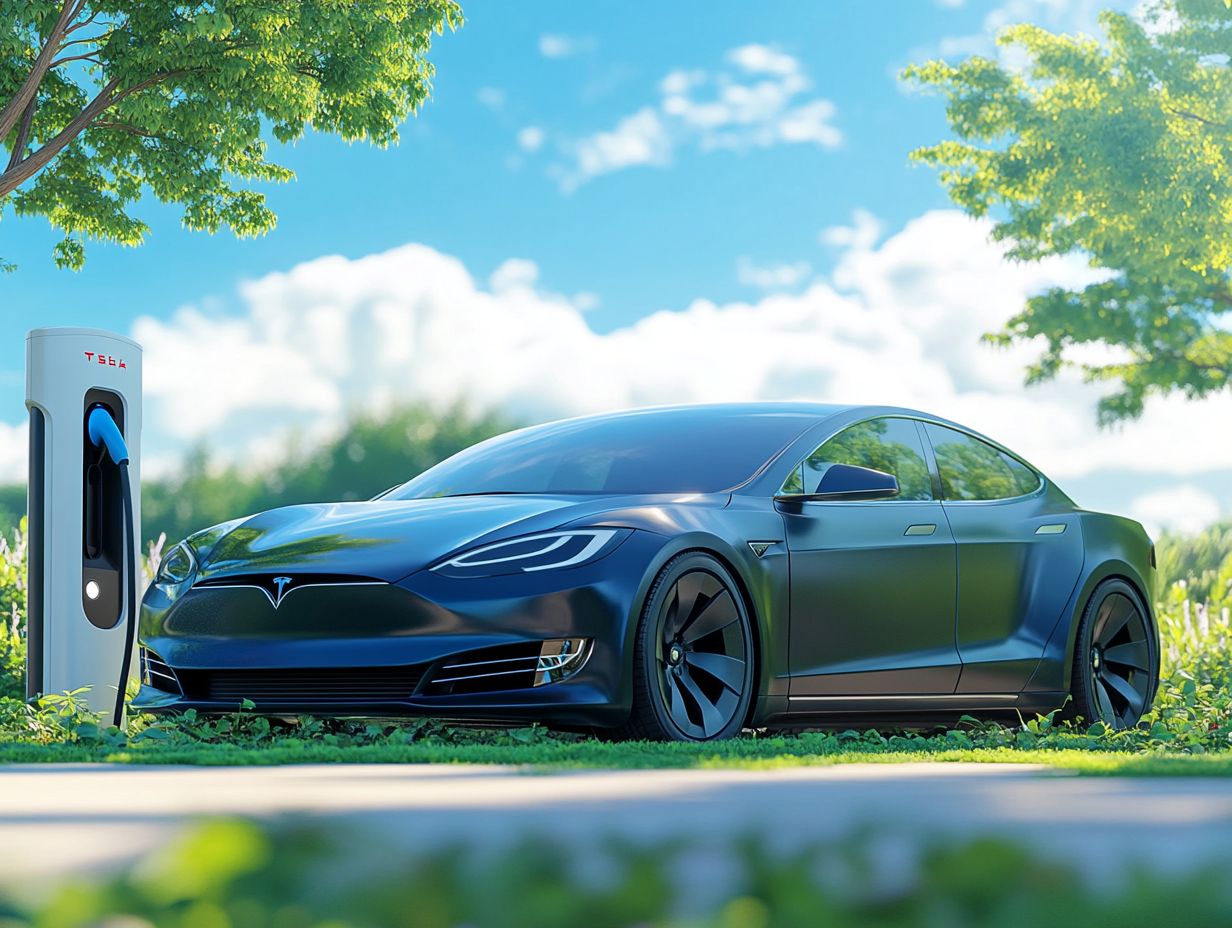
What are the top 5 key benefits of electric vehicles in 2024?
- Environmental sustainability: Electric vehicles emit significantly less greenhouse gases and pollutants. This helps reduce air pollution and combat climate change.
- Cost savings: Electric vehicles have lower fuel and maintenance costs than traditional gas-powered cars. This leads to long-term savings for owners.
- Technological advancements: As electric vehicles become more popular, technology will improve. This will make them even more efficient and convenient.
- Government incentives: Many governments offer incentives and subsidies for purchasing electric vehicles. This makes them more affordable for consumers.
- Improved driving experience: Electric vehicles provide smoother, quieter rides and instant acceleration. This results in a more enjoyable driving experience.
How will electric vehicles contribute to a more sustainable future in 2024?
Electric vehicles will reduce reliance on fossil fuels for transportation. This will significantly decrease air pollution and contribute to efforts against climate change.
What advancements in technology can we expect to see in electric vehicles by 2024?
By 2024, expect more improvements in battery technology. This will allow for longer driving ranges and faster charging times.
Will electric vehicles save me money in the long run?
Yes! Electric vehicles generally have lower fuel and maintenance costs than traditional gas-powered cars. These savings, along with possible government incentives, make them a more affordable choice over time.
How will the availability of charging stations impact the use of electric vehicles in 2024?
Expect a significant increase in charging stations by 2024. This will make it easier for owners to recharge their cars and reduce range anxiety.
What can we expect from the future of electric vehicles in 2024?
In 2024, electric vehicles are set to become mainstream! Look forward to more affordable options and the best electric vehicle features as well as exciting advancements in technology and infrastructure to support their use.


